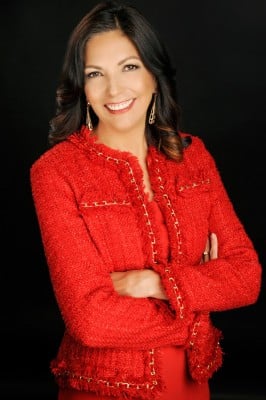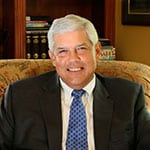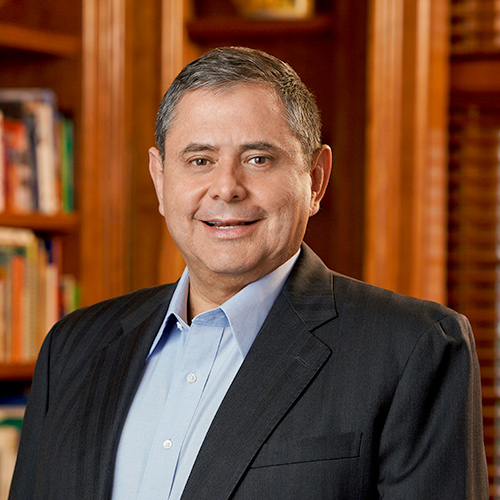Cynthia Mares was never told to go to law school; she was simply driven to be a lawyer. The first in her family to go to college, Mares graduated from the University of Colorado–Boulder in 1979 with a degree in business administration. She worked in real estate for a year, then at the Social Security Administration, and then—after a six-month break to study Spanish at the Universidad Nacional Autonoma de Mexico—as a computer-mapping specialist for an oil company. Secretly, though, she wanted to do more with her life and began to quietly pursue law school.

Now, the national president of the Hispanic National Bar Association (HNBA) has enjoyed a career spanning over twenty-five years in public service—as a deputy state public defender, assistant regulation counsel for the Colorado Supreme Court, and currently, as Arapahoe County public trustee. She talks to HE about how her role as president of HNBA has best defined her career to date.
HE: What prompted you to go to law school? Did you have mentors who encouraged you?
Unfortunately, I did not have any mentors. I just knew I wasn’t satisfied with my career. When I applied to law school, I didn’t tell anyone because I thought my dream was too big. I didn’t know any lawyers, nor did I really know what lawyers did. It was not until I passed the LSAT and got my letter of acceptance from the University of Denver Sturm College of Law that I even told my parents.
Is that one reason you’re such a big proponent of the importance of mentorships now?
Absolutely, and it is definitely the reason why I’m so dedicated to the Colorado Hispanic Bar Association and the HNBA. Having mentors is critical. I’m not sure how I navigated my way through law school, but it sure would have been nice to have mentors, not only for encouragement, but direction and advice. I tell students all the time that it does them no good to be shy about asking questions and meeting people in your field of interest. If you don’t know anyone personally, then ask around and find someone who can help you. If you want to be an engineer, meet engineers. If you want to be a lawyer, meet lawyers. Most professionals are happy to help aspiring students.
The HNBA has several programs that mentor young people, correct?
Yes. One for high school students is the Legal Education Action Program (LEAP), which provides full scholarships to twenty-five Hispanic high school students each year to spend one week on a university campus, meeting with national and international business leaders, lawyers, judges, state officials, law students, and law professors who serve as guides and mentors. The week ends with a mock trial competition.
What other programs are designed to increase the pipeline of diverse law school candidates?
Another is HNBA’s Law School–Sí Se Puede/Yes You Can. This four-year program, founded by the Honorable Christine M. Arguello, a US District Court judge in Colorado, matches student-fellows with mentors who guide them through college, demystify the law school application process, and help them gain admission to the law school of their choice. The program provides skill-building workshops, immersion experiences, and a community of legal professionals committed to the students’ success. We intend to launch this in the fall and hope to enroll fifteen students in each participating state.
The HNBA also has partnerships with Microsoft (for law students interested in intellectual property law) and MetLife. The latter program sponsors receptions around the country, during which law students are introduced to potential mentors and have the opportunity to mingle with professionals in the legal community.
There is also a division within the HNBA particularly for Latina lawyers, correct?
Yes, the HNBA Commission on the Status of Latinas in the Legal Profession was created in 2009 to serve as the advocate for Latina lawyers and law students and to address obstacles hindering their advancement in the legal profession. Just 4 percent of all US lawyers are Hispanic, and only 1.3 percent are Latinas, even though Hispanics represent 17 percent of the population.
Thanks to Walmart, the Commission’s premier sponsor, we are able to offer a wide variety of educational and leadership training programs for Latinas. Some of our programming is for high school students; some is for established attorneys.
The incoming HNBA president has the honor of appointing twenty-five members to the Commission for a one-year term. This year, I asked each commissioner to hold an event in their respective cities for young Latinas interested in law. The first was held in March 2015 at Fox Tech High School in San Antonio. The next one will take place in Denver.
Could you also give us an overview of the programs HNBA offers to already-established attorneys?
How long do we have to talk? We have so many! Last year, we offered our members a mini-MBA program. This year, at our annual Corporate Counsel Conference in San Antonio, we offered a Director Professionalism program to help senior attorneys get on corporate boards. This one-day training program sold out faster than any other program we’ve ever offered. Business development is increasingly important for attorneys, so we also unveiled the HNBA Business Development Institute. We also offered an enhanced speed-networking program. As I always say, we have something for everyone.
We will be introducing a new program at our annual convention (in September 2015) for solo and small-firm attorneys. I discovered that some people weren’t joining the HNBA because they thought it was only for corporate counsel and big law firm associates and partners. That was especially troubling, since 70 percent of Hispanic lawyers are solo practitioners or work for small firms. So, we’re going to have a two-day track dedicated to these lawyers. We are also offering an international law track, which I’m sure will be a hit.
We’re also launching the HNBA National Lawyer Referral Service. This will be a searchable database on our website, allowing anyone to locate an HNBA member by name, practice area, and state of admission, and will provide their contact information. This is a much-needed benefit for our members and the general public.
How politically active is the HNBA?
In addition to our year-round advocacy, the HNBA goes to Washington, DC, twice a year to advocate for issues that affect our communities. One of the visits is as part of the Coalition of Bar Associations of Color (CBAC); the other is HNBA’s annual Advocacy on the Hill.
Which issues does the HNBA get involved in and advocate for?
Some of the issues we advocate for include voting rights, economic empowerment, pay equity, immigration reform, the DREAM Act, diversity on the federal bench and other executive positions, and the Smarter Sentencing Act.
If you could pick one thing to be remembered for, either something you’ve already achieved or that you hope to accomplish in the future, what would it be?
It would be my dedication to the [HNBA] and the creation of programs that actually benefit our members… to affirm that I listened and acted upon what our members really wanted.

